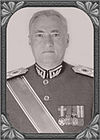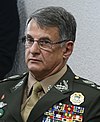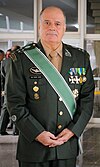
The Brazilian Armed Forces are the unified military forces of the Federative Republic of Brazil. Consisting of three service branches, it comprises the Brazilian Army, the Brazilian Navy and the Brazilian Air Force.

General Augusto Tasso Fragoso, better known as Tasso Fragoso was a Brazilian soldier, judge of the Superior Military Tribunal and writer. During the Revolution of 1930 he was president of the Provisional Government Board of 1930, which ruled Brazil from 24 October to 3 November, between the deposition of President Washington Luis and the inauguration of Getúlio Vargas.

The Brazilian Army is the branch of the Brazilian Armed Forces responsible, externally, for defending the country in eminently terrestrial operations and, internally, for guaranteeing law, order and the constitutional branches, subordinating itself, in the Federal Government's structure, to the Ministry of Defense, alongside the Brazilian Navy and Air Force. The Military Police and Military Firefighters Corps are legally designated as reserve and auxiliary forces to the army. Its operational arm is called Land Force. It is the largest army in South America and the largest branch of the Armed Forces of Brazil.

The Military Academy of Agulhas Negras is the biggest among several schools of formation of combatant officers of the Brazilian Army. It originated in 1792 with the creation of the Royal Academy of Artillery, Fortification and Drawing, the first military school of the Americas, in the city of Rio de Janeiro. Today the Academy is located in the city of Resende, in the state of Rio de Janeiro.
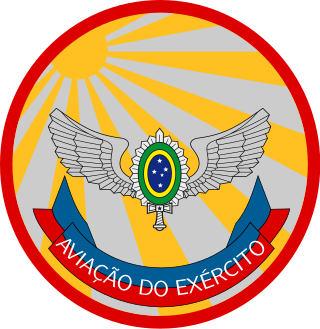
The Brazilian Army Aviation is the air segment of the Brazilian Army, operating rotary-wing aircraft (helicopters) in conjunction with surface forces such as the 12th Light Infantry Brigade (Airmobile). Originally founded with aircraft in 1919, it ceased to exist in 1941, re-emerging in its current form in 1986. It has mainly transport aircraft in addition to light attack helicopters, but does not use dedicated attack helicopters. Its command (CAvEx) in Taubaté, São Paulo, is linked to the Land Operations Command, in Brasília, and the Southeastern Military Command. CAvEx only has subordinates in the 1st and 2nd battalions, also in Taubaté. The 3rd and 4th are respectively in Campo Grande and Manaus, subordinate to the Western and Amazonian Military Commands, and there is a detachment in Belém, in the Northern Military Command.

This article presents the insignia and ranks of the Brazilian military. The insignia and ranks of the Brazilian military are defined by Act no. 6880 of December 9, 1980.

Carlos Frederico Lecor was a Portuguese-born Brazilian general and politician. He was the first Baron of Laguna, in Portugal, and later ascended to Viscount of Laguna, in Brazil.

The Chief of the Joint General Staff of the Armed Forces is the professional head of the Brazilian Armed Forces, who is responsible for the centralizes the coordination and control of the three branches: Army, Navy and Air Force. The position was created through the Complementary Law No. 136 of 25 August 2010, and is guided by Ordinance No. 1429.
Francis Daniel McCann, better known as Frank McCann was a historian, and an American Brazilianist expert in Brazilian military history. He was a professor emeritus at the University of New Hampshire.

Joaquim Silva e Luna, is a Brazilian politician and former Brazilian Army general who served as Minister of Defence from February 2018 until January 2019.

Walter Souza Braga Netto is a retired Brazilian army general and former Minister of Defence. Braga was Commander of the Eastern Military Command and, until 31 December 2018, Federal Interventor in the Public Security of the state of Rio de Janeiro. He unsuccessfully ran for Vice President of Brazil as running mate of Jair Bolsonaro in 2022, narrowly losing to Luiz Inácio Lula da Silva and Geraldo Alckmin.

General Geraldo Antônio Miotto was a senior officer of the Brazilian Army. As a member of the Army High Command, he was the Commander of the Amazon Military Command and Southern Military Command.

Paulo Sérgio Nogueira de Oliveira is a Brazilian Army general who served as minister of defence of Brazil.

A military crisis was triggered in March 2021 when Brazil's highest military officials resigned in response to President Jair Bolsonaro's attempts to politicize the armed forces. Since the beginning of his government, Bolsonaro had appointed an unprecedented number of military personnel to civilian positions, seeking to receive, in exchange, support from the military, including through public demonstrations in favor of his government's policies and against the measures adopted by the governors to confront the COVID-19 pandemic, in addition to advocating the decree of the State of Defense, as a way to increase its powers.

The Aerospace Operations Command is a joint command of the Brazilian Armed Forces in charge of planning, coordinating and conducting the employment of aerospace assets. Although part of the Brazilian Air Force's structure, it includes personnel from the Brazilian Army and Navy. COMAE is the central body in the Brazilian Aerospace Defense System and as such, is directly responsible for the aerospace defense of Brazilian territory and may control Air Force, Army and Navy units.

The Brazilian Army General Staff is the general management body responsible for the coordination of the Brazilian Army, the land force of the Brazilian Armed Forces.
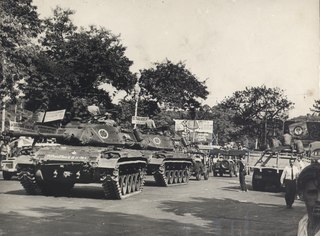
The term "military apparatus" refers to a policy of appointing officers of the Brazilian Armed Forces during the government of João Goulart (1961-1964), consisting of favoring, in promotions and nominations to important commands, military officers considered reliable. It is considered the work of the head of the President's Military Cabinet, Argemiro de Assis Brasil, who, however, later denied its existence. The filling of the high commands with loyal officers was supposed to assure the president's mandate and was considered relevant both within the government and the opposition. However, it did not prevent the deposition of Goulart in the 1964 coup d'état, which was joined by members of the "apparatus", some of whom had participated in the preceding conspiracy.
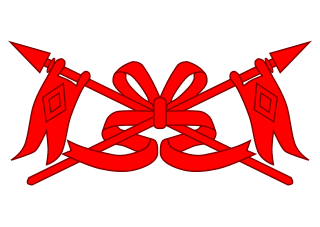
The Brazilian cavalry is one of the branches that make up the Brazilian Army. It operates in armored vehicles and, like the infantry, has the role of directly confronting the enemy, but with distinct missions such as reconnaissance and vanguard. It is organized into regiments and squadrons, which are equivalent to the infantry's battalions and companies. Its main types are tank, mechanized, armored and guard. Its troops serve in vehicle crews or as fusiliers on board, who can also fight on foot.

Marco Antônio Freire GomesGCMM is a retired Army general of the Brazilian Army, Commander from 31 March to 30 December 2022.



















